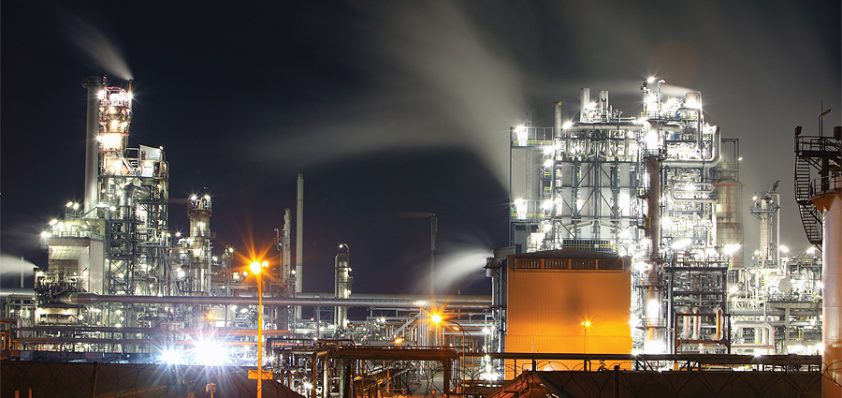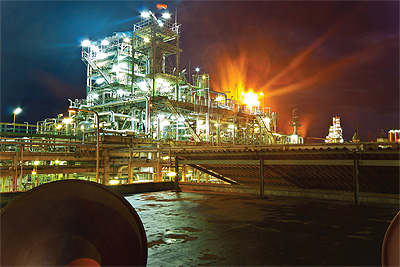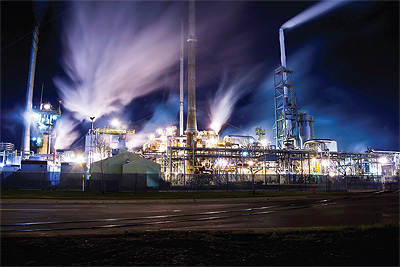
Holborn Refinery: Sustaining Efficiency and Innovation in a Competitive Market
A refined process
The Holborn refinery has operated as part of the wider Oilinvest Group since October 1987, when the company acquired the facility from its former owners Exxon. Located in the outskirts of the city of Hamburg, the ‘Holborn Europa Raffinerie,’ consists of approximately 87 hectares of land and is located at the south fork of the Elbe River and seaport basin. The refinery is well placed for easy access by ships arriving from the North Sea, by the inland waterways of the Elbe, by motorway, as well as by rail, with sidings on-site and an adjoining rail yard. Thus the refinery is able to receive ships of up to 80,000 metric tonnes carrying crude oil and feedstocks. Finally, the refinery receives VLCC delivered crude oil supplies via its 147 km pipeline from the North West Oelleitungs GmbH deep-water terminal in Wilhelmshaven.

Holborn is owned by the Oilinvest Group overall, but operates more directly as a subsidiary of Holborn Investment Company, based in Larnaca, Cyprus. “It operates under the Oilinvest umbrella for the German market in the same way as all Tamoil companies,” explains Corporate Communications Officer of the Oilinvest Group, Marja van Renesse.
The Holborn refinery was originally built during the 1920s and was expanded in 1950 and again in 1972. It was shut down 13 years later and finally taken over by Holborn Europa Raffinerie in 1987, before restarting crude oil processing in January 1988, with the plant’s FCC unit going into operation during April of the same year. Since the acquisition, the refinery has progressed with the modernisation of units, which are essential to long-term productivity. As a result it is able to produce sulphur-free fuels to meet today’s most stringent standards.
“The Holborn plant is a medium conversion cat-cracking refinery with a processing capacity of around 105,000 barrels of crude per day, and an average annual throughput of up to five million tonnes,” elaborates Managing Director, Frank Heyder. “The refinery is well equipped with desulphurisation capacity to meet most stringent European fuels standards and, with more than 50 per cent of yield pattern, focused on ULSD production.”
One of the most significant developments that occurred at the Holborn Europa Raffinerie was the modernisation programme that took place at the beginning of the new millennium. This was undertaken in order to conform to a European Union Clean Air Directive, which came into effect on 1st January 2005. Approximately €200 million were invested at the Hamburg oil refinery. The new units have been tied into the course of a scheduled five weeks turnaround and trouble-free commissioned in the course of re-commissioning the refinery after completion of the TA.
“The ‘Clean Fuels Project’ resulted in a deep desulphurisation unit for diesel and distillates, an isomerisation unit, crack naphtha desulphurisation and the steam reforming unit, as well as desulphurisation and modification of the original gas oil hydrotreater,” Frank Heyder says. “This was an old design from the 1970s and is now a unit that can also produce diesel and sulphur, at sulphur-free quality. Today, the Hamburg refinery is not only able to fulfil the European Union specifications but can also produce high quality products for niche markets and cyclohexane for the chemical market. Since we went through the Clean Fuels Project the refinery has been running smoothly and on a stable level.”
Presently the refinery employs 293 dedicated members of staff and is able to handle a full range of refined products including, liquefied petroleum gases, petrol, petrochemical grade naphtha, kerosene, diesel, heating and fuel oils. To support its operations Holborn also maintains off-site areas of the facilities comprised of tank farms, product shipping and receiving facilities, product blending systems and wastewater treatment plants. The refinery’s principle client is the Holborn European Marketing Company in Cyprus, with customers taking delivery of the products at the refineries loading facilities.
While the refinery benefits from its association with the wider Oilinvest Group, it must continue to focus on efficient operation to meet the demands of an increasingly competitive market. “The Holborn refinery is an integral part of our overall business and has played an important role in achieving our success in Germany,” Marja van Renesse says. “As with all our assets we continue to run the refinery in an efficient and cost effective manner whilst adhering to environmental, health and safety regulations.”
“We are in a shrinking market so we are not making ambitious expansion plans. Rather, we are concentrating on the execution of smaller efficiency programmes, energy conservation investigations and cost improvement projects, all of which will be ongoing over the next few years,” Frank Heyder concludes. “We are well located within the market with demand patterns well above refinery capacity. We also benefit from engaged and loyal staff, lean organisation with minimum head count and excellent traffic connections.”
Holborn Europa Raffinerie
Services: Oil refinery